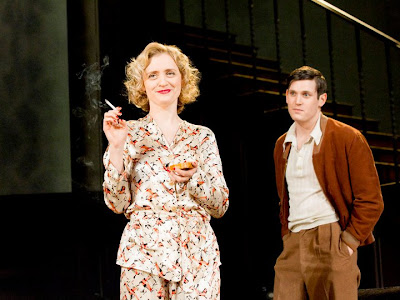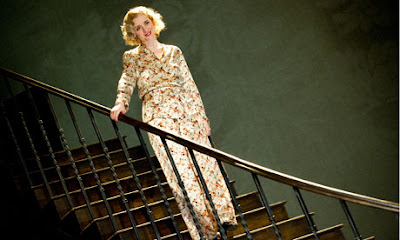 See there IS a God.... I had doubts whether the hilarious US comedienne Kathy Griffin would ever come and play over here as her act is so based around US celebrities and politics but last Sunday there she was - playing a sell-out show at the Palace Theatre. So of course there I was too!
See there IS a God.... I had doubts whether the hilarious US comedienne Kathy Griffin would ever come and play over here as her act is so based around US celebrities and politics but last Sunday there she was - playing a sell-out show at the Palace Theatre. So of course there I was too!After a suitably diva-ish wait we were treated to the usual rapidly-edited video introduction to all things Kathy - from her early stand-up act through to appearing with Brooke Shields in the sitcom "Suddenly Susan" and onto her cameos in films ("Pulp Fiction"), tv shows ("Glee") and even pop videos (Eminem's "The Real Slim Shady"). There was also clips from her reality show "My Life On The D List" and her controversial appearances on tv such as the all-women chat show "The View" a
 nd the CNN New Year broadcast from Times Square with straight-laced Anderson Cooper when she screamed at a heckler "SHUT UP - DO I COME TO WHERE YOU WORK AND SLAP THE DICKS OUT OF YOUR MOUTH?"
nd the CNN New Year broadcast from Times Square with straight-laced Anderson Cooper when she screamed at a heckler "SHUT UP - DO I COME TO WHERE YOU WORK AND SLAP THE DICKS OUT OF YOUR MOUTH?" And there she was! She was utterly hilarious, working her way through the few UK celebrities she had sussed out and her appearance a few days earlier on The Graham Norton Show with Cameron Diaz and Bear Grylls who needless to say came in for some severe shit-taking thanks to his Born-Again tweets and posh background.
She was very impressed by the audience being so aware of "right-wing nutjobs like Michele Bachmann - she said she played a gig in the South recently and there were unaware of her and her protestations that slavery was stopped by the founding fathers of the country!
In her 2 hour show Kathy mostly took well-aimed,
 beautifully-timed jabs at her favorite targets: Oprah Winfrey, Whitney Houston, Gwyneth Paltrow and most pleasing of all, Sarah Palin who recently pathetically called Kathy a "50 year old bully" - as if her knuckle-headed comments don't amount to a rally-cry for bullies everywhere.
beautifully-timed jabs at her favorite targets: Oprah Winfrey, Whitney Houston, Gwyneth Paltrow and most pleasing of all, Sarah Palin who recently pathetically called Kathy a "50 year old bully" - as if her knuckle-headed comments don't amount to a rally-cry for bullies everywhere.I have enjoyed Kathy's eleven tv specials on YouTube as I presume the rest of the heavily gay audience had and I am being generous in saying that the excitement of finally seeing her in the flesh maybe provoked the near-hysterical response to her every statement. After a while it got really wearing, as if they were all trying to out-do each other in braying,
However nothing could stop me finally enjoying Kathy in the flesh! A woman after my own heart "I only talk about people behind their backs. It's called manners."
To give you an idea of the way she spins real life into her act here is her recent run-in with THE VIEW co-host - and right-wing bimbo - Elisabeth Hasselbeck (it's hilarious to watch the unease of the other co-hosts)
and here is Kathy's side of it: http://youtu.be/InDSLBsyFSc














































